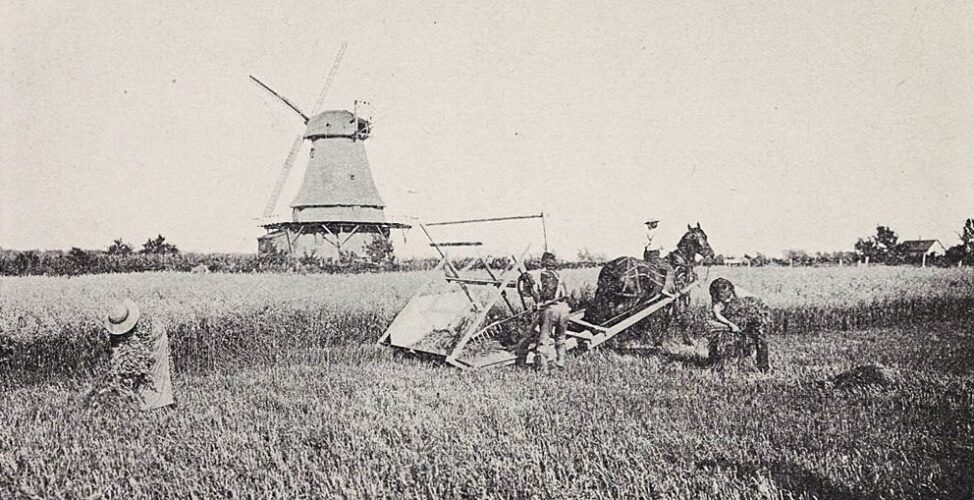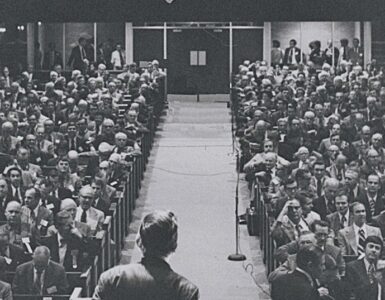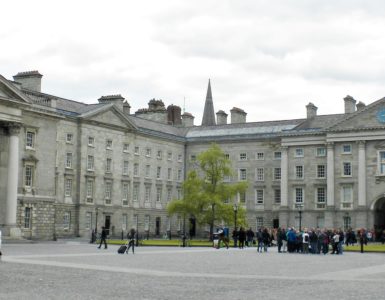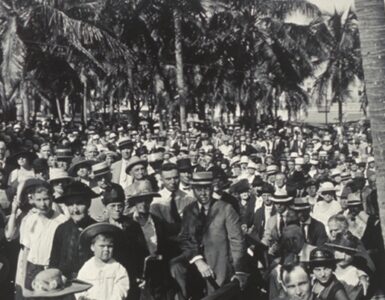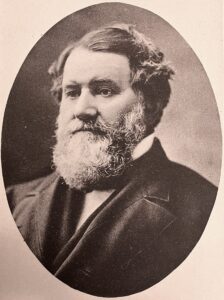 This biography is not about a minister but instead briefly tells the life of a Presbyterian layman who was an inventor and industrialist. His life began on the farm as did many of the lives of antebellum entrepreneurs. Cyrus’s father Robert was born at Walnut Grove, Rockbridge County, Virginia, June 4, 1780, into the household of a successful and prosperous farmer. Robert was deeply interested in the mechanical aspects of agriculture and was a skilled worker of wood and iron enabling him to improve existing tools and develop new ones. When Cyrus Hall was born to Robert and Mary Ann (Hall) McCormick, February 15, 1809, it was into a home where his future would be directed vocationally towards the machinery of agriculture. But it was also certain his spiritual guidance would be defined by the Westminster Standards held to by his parents as Old School Presbyterians. One biographer of McCormick, Herbert N. Casson, has described the spiritual influences on Cyrus as having been “nourished on” Calvinism from the time when he “first learned to read out of the Shorter Catechism and the Bible” (158). Casson also notes,
This biography is not about a minister but instead briefly tells the life of a Presbyterian layman who was an inventor and industrialist. His life began on the farm as did many of the lives of antebellum entrepreneurs. Cyrus’s father Robert was born at Walnut Grove, Rockbridge County, Virginia, June 4, 1780, into the household of a successful and prosperous farmer. Robert was deeply interested in the mechanical aspects of agriculture and was a skilled worker of wood and iron enabling him to improve existing tools and develop new ones. When Cyrus Hall was born to Robert and Mary Ann (Hall) McCormick, February 15, 1809, it was into a home where his future would be directed vocationally towards the machinery of agriculture. But it was also certain his spiritual guidance would be defined by the Westminster Standards held to by his parents as Old School Presbyterians. One biographer of McCormick, Herbert N. Casson, has described the spiritual influences on Cyrus as having been “nourished on” Calvinism from the time when he “first learned to read out of the Shorter Catechism and the Bible” (158). Casson also notes,
From his father he had training as an inventor; from his mother he had executive ability and ambition; from his Scots Irish ancestry he had the dogged tenacity that defied defeat; and from the wheat-fields that environed his home came the call for the reaper, to lighten the heavy drudgery of the harvest. (25)
Cyrus invented his first successful machine for reaping grain when he was only twenty-two years old. It was not perfect, but it was the first step towards reducing the great number of people and hours of labor required for harvesting the fields full of amber waves of grain. He demonstrated his new machine to his father by harvesting rye on the family farm. Cyrus did not seek a patent until 1834 after three years of refining its design to improve the machine’s durability and efficiency. He continued to modify the reaper for another five years while living at Walnut Grove and using his father’s blacksmith shop. The first two machines he sold were purchased locally in 1840 but by 1843 he had sold forty reapers in Virginia. His market expanded until by 1845 he was selling reapers in Michigan, New York, Tennessee, Ohio, Illinois, Wisconsin, Iowa, and Missouri. The market had grown greatly in what is currently called the Midwest, so Cyrus moved his business to Chicago and expanded production with a new factory.
His reaper was described as having provided hunger-insurance for the United States and the greater part of the civilized world, with more than a half million manufactured since the first one was sold in Virginia. (Casson, 188)
McCormick’s reaper and other technological innovations contributed greatly to making America, particularly the Midwest, the breadbasket of the world. McCormick received numerous awards for his agricultural wonder, but his greatest technological recognition may have been granted by the French Academy of Sciences when they said that he had “done more for the cause of agriculture than any other living man.”
McCormick did not marry until 1858 because he often worked fourteen hours a day, but when he met Nettie Fowler of New York, she changed his habits. During their years of marriage Nettie was his primary business associate providing advice and assistance concerning the family business. When the Great Fire of Chicago took place in 1871 and destroyed the McCormick manufacturing facilities, Cyrus was ready to give up, but Nettie convinced him to rebuild and she contributed time and talents to completing the new factory.
There are two common results of inventing a life-changing machine-like McCormick’s reaper—great personal wealth and spending a considerable part of that wealth defending patents. Henry Ford, the Wright Brothers, Glenn Curtiss, Alexander Graham Bell, and Thomas Edison all prospered financially but consumed considerable time and money defending their inventions. McCormick also fought patent infringement, nevertheless he was still generous to the Presbyterian Church, especially the denomination’s educational ministries. One of the greatest gifts by McCormick was endowing four chairs in the Presbyterian Theological Seminary of the Northwest in Chicago. The seminary had struggled to exist for several years in different locations but finally found a permanent site in Chicago in 1859 thanks to a gift of land from some city philanthropists and a $100,000.00 gift from McCormick to endow four faculty chairs. Each of the chairs had several candidates, but in the end Nathan L. Rice was elected Professor of Didactic and Polemic Theology; Willis Lord became Professor of Biblical and Ecclesiastical History; Le Roy J. Halsey was the Professor of Historical Theology; Pastoral Theology, and Church Government; and William F. Scott became Professor of Biblical Literature and Exegesis. Other professors from the seminary’s past include Willis G. Craig and Francis L. Patton.
Cyrus Hall McCormick died May 13, 1884. The total production of wheat for all the nations that provided statistical data the year McCormick died was 2,240,000,000 bushels, which was a harvest that could not have been obtained without McCormick farm machinery. Many memorials and reminiscences were given in his memory but possibly the greatest was changing the name of the Presbyterian Theological Seminary of the Northwest to McCormick Theological Seminary in 1886. The McCormicks had six children, one was Cyrus Jr., who became president of International Harvester, his brother Harold became the company treasurer, and brother Stanley was the comptroller. In 1902, the McCormick Harvesting Machine Company, William Deering’s agricultural equipment company, and three other manufacturers merged to form International Harvester. A son named Robert died in infancy and the two daughters were named Virginia and Anita. Nettie Fowler McCormick died in 1923.
John F. Lyons, Librarian of McCormick Seminary, said the following about McCormick’s contributions to Old School Presbyterianism in his Centennial Sketch of the History of the Presbytery of Chicago, 1947.
The outstanding leader in the Chicago Old School presbytery, corresponding in a measure to R.W. Patterson of the New School, was not a minister, but a layman, Cyrus H, McCormick. There was no Old School church in the city till after his arrival, and he had a share in the organization of the one that soon made its appearance. He had much to do with the organization of the additional Old School churches, South and Central, that in the course of time came into existence. (18)
There are extensive archives of material for both Cyrus and Nettie McCormick. Cyrus has been written about as an inventor and businessman, but it might make an interesting thesis or dissertation to get into the correspondence of both Nettie and Cyrus regarding their Christianity, church membership, generosity, and spiritual influences.
Barry Waugh
Notes—The header picture is said to be “The first successful reaper invented by Cyrus Hall McCormick in 1831 and patented in 1834,” and it looks like a McCormick reaper but photographed at a later date; it is from the June 1920 issue of the Armco Bulletin as provided by Wikimedia Commons in conjunction with Midpointe Library System. Helpful were books about McCormick Seminary including Leroy J. Halsey, A History of the McCormick Theological Seminary of the Presbyterian Church, Chicago: Published by the Seminary, 1893; James G. K. McClure, The Story of the Life and Work of the Presbyterian Theological Seminary in Chicago Founded by Cyrus H. McCormick, Chicago: [n.p.], 1929; and McCormick Theological Seminary of the Presbyterian Church General Catalogue, 1830-1912, Chicago: Published by the McCormick Theological Seminary, 1912. Some information is from the brief article on McCormick in the 1911 Encyclopedia Britannica. Also helpful was R. G. Thwaites, Cyrus Hall McCormick and the Reaper, 1909; and, In Memoriam: Cyrus Hall McCormick, Born February 15th, 1809 & Died May 13th, 1884, Cambridge: The Riverside Press, [1884]. The full title of H. N. Casson’s book is Cyrus Hall McCormick, His Life and Work, 1909.


